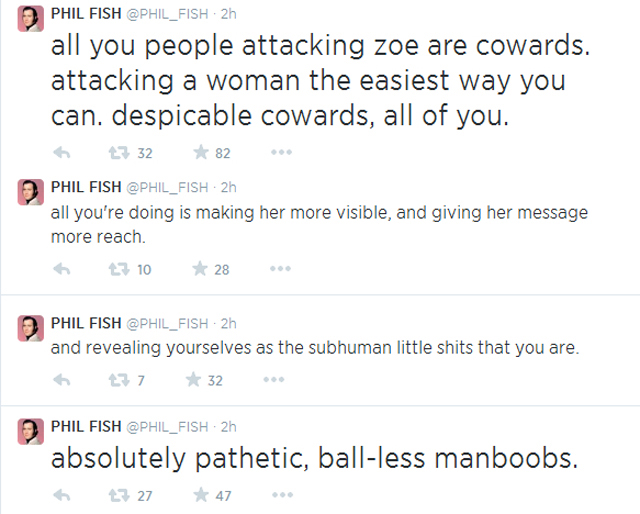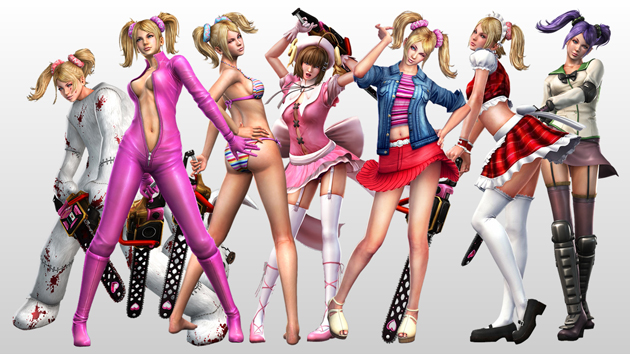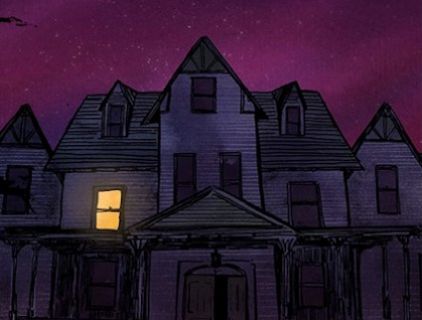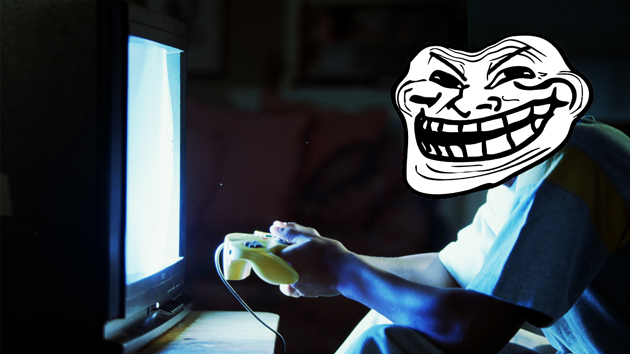
Ingram Publishin/Thinkstock
Video game critic and feminist author Anita Sarkeesian canceled a speaking engagement at Utah State University on Tuesday after an email from an unknown source promised “the deadliest school shooting in American history” and threatened that Sarkeesian would “die screaming like the craven little whore that she is if you let her come to USU.” Sarkeesian is the creator of an online video series that critiques mainstream video games for misogyny; she has long been the target of violent threats from online trolls. Despite that Sarkeesian had every reason to be concerned about the specter of vicious misogyny mixed with guns, USU officials said that under state law concealed weapons could not be barred from the event. She blasted the university late Wednesday for how it handled the situation:
USU acted irresponsibly. They did not even inform me of the threat. I learned about it via news stories on Twitter after I landed in Utah.
— Feminist Frequency (@femfreq) October 16, 2014
Sarkeesian noted recently that she has been “subjected to the worst harassment I’ve ever faced” as part of a convoluted conflict known as #Gamergate, which has been roiling the gaming industry since August. Playing out primarily on social media, #Gamergate centers around several women who work in the industry and have criticized its dominant macho culture and frequent sexualization of women. Their critique has met with intense harassment and bullying. The FBI is currently investigating the threats against Sarkeesian and others, according to Vice.
On one level, #Gamergate is an internal squabble between ideologically opposed factions within the gaming world. But now, disturbing developments such as Sarkeesian’s canceled appearance reflect how the controversy has blown up beyond the familiar trappings of online nastiness and spilled into real life—with serious consequences. At least two women involved in #Gamergate have said that they had to flee their homes, fearing for their safety. Kyle Wagner at Deadspin suggests that #Gamergate may be no less than “the future of grievance politics as they will be carried out by people who grew up online.”
So what is #Gamergate and how did this all start?
#Gamergate is essentially an escalating fight about the direction of gaming culture. It pits a group of feminists and their supporters—who advocate for expanding beyond the testosterone-fueled games that dominate the industry—against a vocal faction that is openly hostile toward their views. The conflict first blew up in August after a programmer named Eron Gonji wrote a revenge post about his breakup with developer Zoe Quinn, the creator of Depression Quest, a critically acclaimed game whose purpose is to illustrate the challenges of coping with depression.
The post implied Quinn had a romantic relationship with a writer for Kotaku, the gaming site run by Gawker Media, supposedly to receive favorable coverage of Depression Quest. In fact, Kotaku never reviewed the game, but nasty attacks against Quinn—including the circulation of nude photos, death threats, and rape threats—quickly flooded sites like Reddit and 4chan. Sarkeesian experienced similar threats just a few days later, after publishing a new video in her series on women and gaming. Brianna Wu, a developer behind a game with all female lead characters, has written about harassment of women in the industry; she received a series of graphic death threats last week after sharing a meme making fun of #Gamergate. She said she had to flee her home as a result.
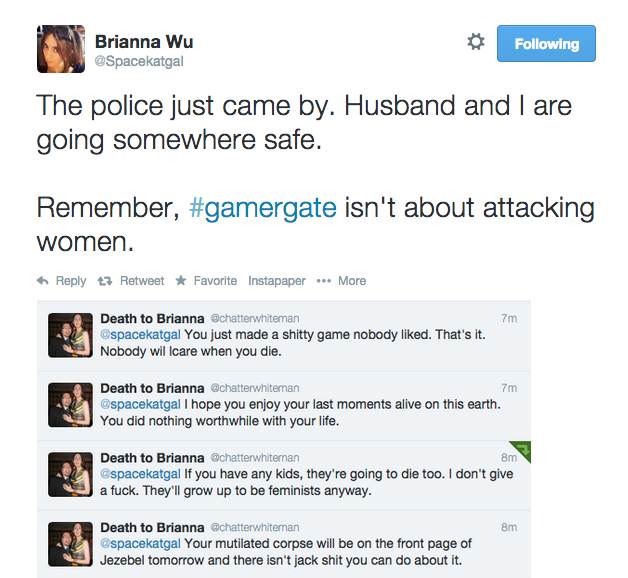
Wu posted a fierce counterattack on Thursday morning:
“Ordinarily, I develop videogames with female characters that aren’t girlfriends, bimbos and sidekicks,” she wrote. “I am a software engineer, a popular public speaker and an expert in the Unreal engine. Today, I’m being targeted by a delusional mob.” That’s the tame part: “They threatened the wrong woman this time. I am the Godzilla of bitches. I have a backbone of pure adamantium, and I’m sick of seeing them abuse my friends.”
Who is responsible for all this nastiness?
It’s hard to say: Most of the viciousness comes from anonymous trolls. However, a couple of particular players have helped inflame the situation:
Adam Baldwin, perhaps best known for portraying paranoid mercenary Jayne Cobb in Firefly and for voicing strident political views on social media, chimed in:
Patterns of Failure: #GunGrabbers exploit dead children to advance their political agenda. Anti- #GamerGate’rs exploit anon-troll threats.
— Adam Baldwin (@AdamBaldwin) October 12, 2014
Hi @BoingBoing: What hard evidence do U have @Spacekatgal was “targeted [by #Gamergate] with credible threats after speaking out on sexism”?
— Adam Baldwin (@AdamBaldwin) October 12, 2014
This is actor @AdamBaldwin and the standards he holds himself to. pic.twitter.com/022TXNv3jX
— Brianna Wu (@Spacekatgal) October 14, 2014
Milo Yiannopoulos, associate editor at Breitbart.com, also helped fuel the haters with a blog post in which he declared “an army of sociopathic feminist programmers and campaigners, abetted by achingly politically correct American tech bloggers, are terrorising the entire community.”
What’s the deal with those strange hashtags and other terms?
Here’s a quick primer:
8chan: A site that allows anyone to anonymously create their own message board. Threads related to #Gamergate originally sprung up on 4chan, but were banned for breaking the site’s policy on distributing personal information. At that point, the conversation largely moved to 8chan.
“Social justice warrior” (or SJW): A derisive term used by many in the #Gamergate crowd to describe its feminist and otherwise inclusion-minded critics. It’s largely synonymous with “PC police.”
#NotYourShield: A Twitter hashtag used to point out that not all #Gamergate supporters are white and/or male. It’s been used by women and people of color sympathetic to the cause to counter claims that the movement is inherently misogynistic or comprised solely of gaming’s status quo. Some claim that many “sock puppets,” or fake accounts, have been created to make the tag appear more popular than it is; there is no way to confirm or deny this.
#StopGamerGate2014: A Twitter hashtag that has garnered around 75,000 tweets since it first appeared late Tuesday night (#Gamergate has been getting around 100,000 tweets a day). It’s essentially a form of counterprotest.
So what is this really all about?
#Gamergaters, as they’re called, say their target isn’t women but instead what they deem to be corrupt journalism. They claim the fact that a game developer like Quinn once had a romantic relationship with a writer at Kotaku is evidence that media coverage of games can be bought and sold with sexual favors. But the writer in question never reviewed Quinn’s game, and nor did anyone else at Kotaku. Kotaku looked into the accusations and said it found no evidence of a conflict of interest.
#Gamergaters argue more broadly that journalists are too cozy with game developers—they fund their projects, date them, and are sometimes roommates or friends with them—which makes it impossible, they say, for gamers to trust reviews from gaming news sites. Polygon, Kotaku, and the Verge have come under attack along these lines. (You can read about their ethics policies here, here, and here.) Other #Gamergaters take issue with a growing pool of gaming writers and editors interested in issues of diversity, inclusion, sexism, and violence in video games. “Headlines are becoming less about gaming and more about mysoginy [sic], feminism, and are reduced to click-grabbing disappointments,” laments one manifesto.
Meanwhile, there is an email listserv called GamingJournoPros that some industry writers use to discuss trends and new releases; its recent “discovery” by Breitbart.com has prompted additional outrage among #Gamergaters, despite that there are multitudes of such listservs in journalism. (Read more from its moderator here.) On the other hand, popular gaming critic Leigh Alexander has compiled a list of more substantive ethics issues in the trade. For instance, “One of the US’s most long-running and successful print game publications is owned by one of the world’s best-known game retailers, and few of the magazine’s consumers seem aware of what, if any impact that relationship might have.”
And if you’re still wondering whether #Gamergate is about journalism ethics, read this piece from Amanda Marcotte, who calls total bullshit. (Well, “horseshit,” to be precise.)
How are tech and social media companies reacting?
Intel was pulled into #Gamergate early this month when it bowed to pressure from an email blizzard by yanking it ads from Gamasutra, one of several sites that have published essays critical of rampant sexism in gamer culture. Subsequently criticized for that move, the company apologized two days later but hasn’t reinstated the ads.
Though #Gamergate first caught fire on 4chan, it exploded on more mainstream social media outlets such as Reddit and Twitter, which have been criticized for providing a platform for its worst elements. On Saturday, for example, developer Brianna Wu left her home after a Twitter user sent her a string of threats including a pledge to choke her to death with her husband’s penis. Though Twitter has suspended those accounts, critics argue it could do much more by, say, actively detecting hostile behavior, limiting fake accounts, and making it easier to block users. Twitter spokesman Nu Wexler referred Mother Jones to the company’s user rules banning targeted abuse. He declined to say how many accounts have been suspended in relation to #Gamergate or if any have been referred to law enforcement.
On Reddit, a group devoted to #Gamergate has more than 11,000 subscribers. Many of the comments in these threads are misogynistic, and Zoe Quinn has produced logs of Reddit chatrooms that show gamers planning to hack her personal accounts. Even so, Reddit’s moderators haven’t shut down its main #Gamergate page. (In contrast, a #Gamergate forum on Github has been disabled by the site’s staff.) “We received a number of contacts related to this issue,” Reddit spokeswoman Victoria Taylor wrote in response to questions from Mother Jones. “Anything that we found or that was reported to us that broke our rules was removed and the user banned.” But it seems that the fallout from #Gamergate hasn’t prompted much concern or soul searching at Reddit: “We do not plan on changing any site policies due to the occurrence of this event.”
How have leaders in the gaming industry responded?
Pushback on the nastiness from the world of gaming journalism has included comments from Stephen Totilo, the editor in chief of Kotaku (and #Gamergate’s journalistic enemy No. 1), who published a piece criticizing the movement and its tactics:
“All of us at Kotaku condemn the sort of harassment that’s being carried out against critics, developers, journalists, and other members of the gaming community. If you’re someone who harasses people online, you’re not a part of the community we want to foster at Kotaku, and you’re actively hurting people and driving important voices away from the video game scene. Enough.”
Chris Plante at Polygon, the Vox Media-owned video game site and frequent #Gamergate punching bag, scolded:
“This week, the obstinate child threw a temper tantrum, and the industry was stuck in the metaphorical grocery store as everyone was forced to suffer through it together. But unlike a child, the people behind these temper tantrums are hurting others. It’s time to grow up.”
And Keith Stuart, games editor of the Guardian, wrote:
“I have found a lot of the actions of self-confessed hardcore gamers horrendous, upsetting and unjustifiable over the past two weeks…I don’t have a problem with the term ‘gamer’…I have a problem with gamers who deny that this industry needs to improve its representation—in terms of race, gender and sexuality.”
On Wednesday, the Entertainment Software Association, gaming’s largest industry group, issued a short statement:
“Threats of violence and harassment are wrong…They have to stop. There is no place in the video game community—or our society—for personal attacks and threats.”
And developer Andreas Zecher wrote a widely circulated “open letter to the gaming community” posted to Medium:
“We believe that everyone, no matter what gender, sexual orientation, ethnicity, religion or disability has the right to play games, criticize games and make games without getting harassed or threatened…If you see hateful, harassing speech, take a public stand against it and make the gaming community a more enjoyable space to be in.”
The letter was signed by hundreds in the gaming community, including people from big-time studios like Electronic Arts, Microsoft, Ubisoft, and Nintendo.
From the indie community, developer Phil Fish has led the charge to defend Quinn and others:
